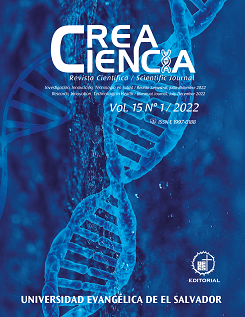Challenges of dental practice in El Salvador, in the face of the pandemic Covid-19 world
DOI:
https://doi.org/10.5377/creaciencia.v15i1.15708Keywords:
Protocol, Biosecurity, DASS 21, coronavirus, odontologyAbstract
The high contagiousness of the COVID-19 virus, determined by its transmission mechanism, through microdroplets that are spread by aerosols when coughing, speaking or sneezing, put professionals such as dentists on the front line of contagion, especially due to distance. working area between the patient's mouth and the operator. The general objective of this study was to describe the challenges of dental practice in El Salvador in the face of the global covid-19 pandemic. Quantitative, descriptive, prospective and cross-sectional research, with a convenience sample of 112 subjects who practice dentistry in El Salvador, from public, private and academic fields. Virtual surveys were applied to them with the Google forms tool. The resulting information was tabulated and analyzed in the statistical program SPSS version 23. All the respondents use protocols of
biosafety for the development of their clinical activities and these vary between national and international protocols. Regarding treatment costs, most of them have had an increase of between 5-10 dollars per patient. The level of depression, anxiety and stress, in the sum of the scale, none presented at 0, highlighting that 30% of them presented stress and anxiety from mild to extremely severe.
Downloads
340
pdf 116
Downloads
Published
How to Cite
Issue
Section
License

This work is licensed under a Creative Commons Attribution-NoDerivatives 4.0 International License.
© Crea Ciencia
Declaration of originality and assignment of rights
The article must be sent with a declaration of originality, responsibility and assignment of rights of copy of the manuscript, scanned and signed by the author or by one of the authors when the authorship is collective (designated author), stating that the text has not previously published in printed or electronic format, which will not be presented to any other media before knowing the decision of the journal Crea Ciencia and that, if accepted for publication, the authors transfer the copyrights in all forms and media known. At the end of six months of the publication, the text can be shared in another magazine citing the first version of the article published in Crea Ciencia and recording its number and volume. If the article is not published, the UEES agrees to return the rights enunciated to their authors.

Crea Ciencia articles are published in open access and licensed under a Creative Commons Attribution-NonCommercial 4.0 International License.

